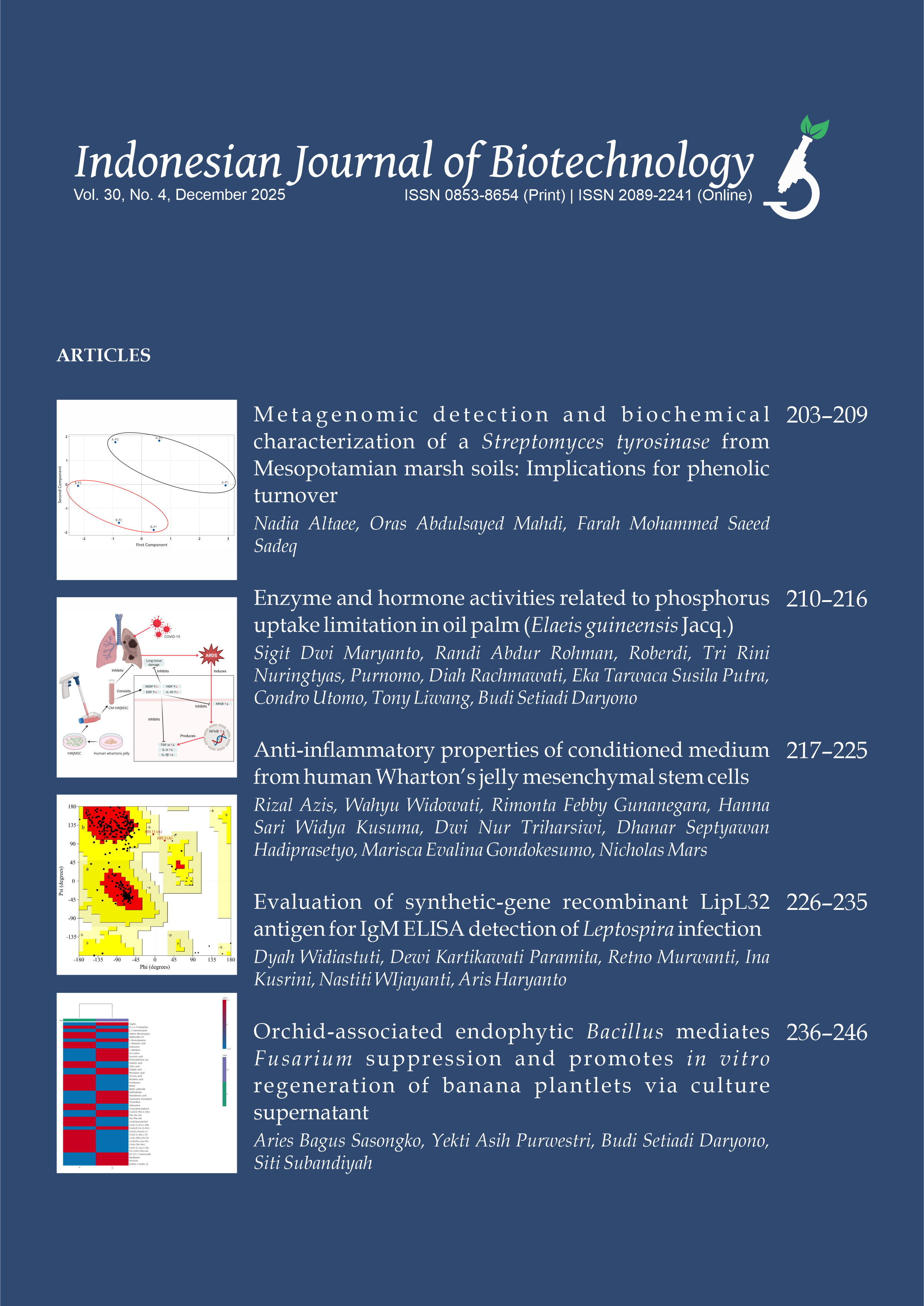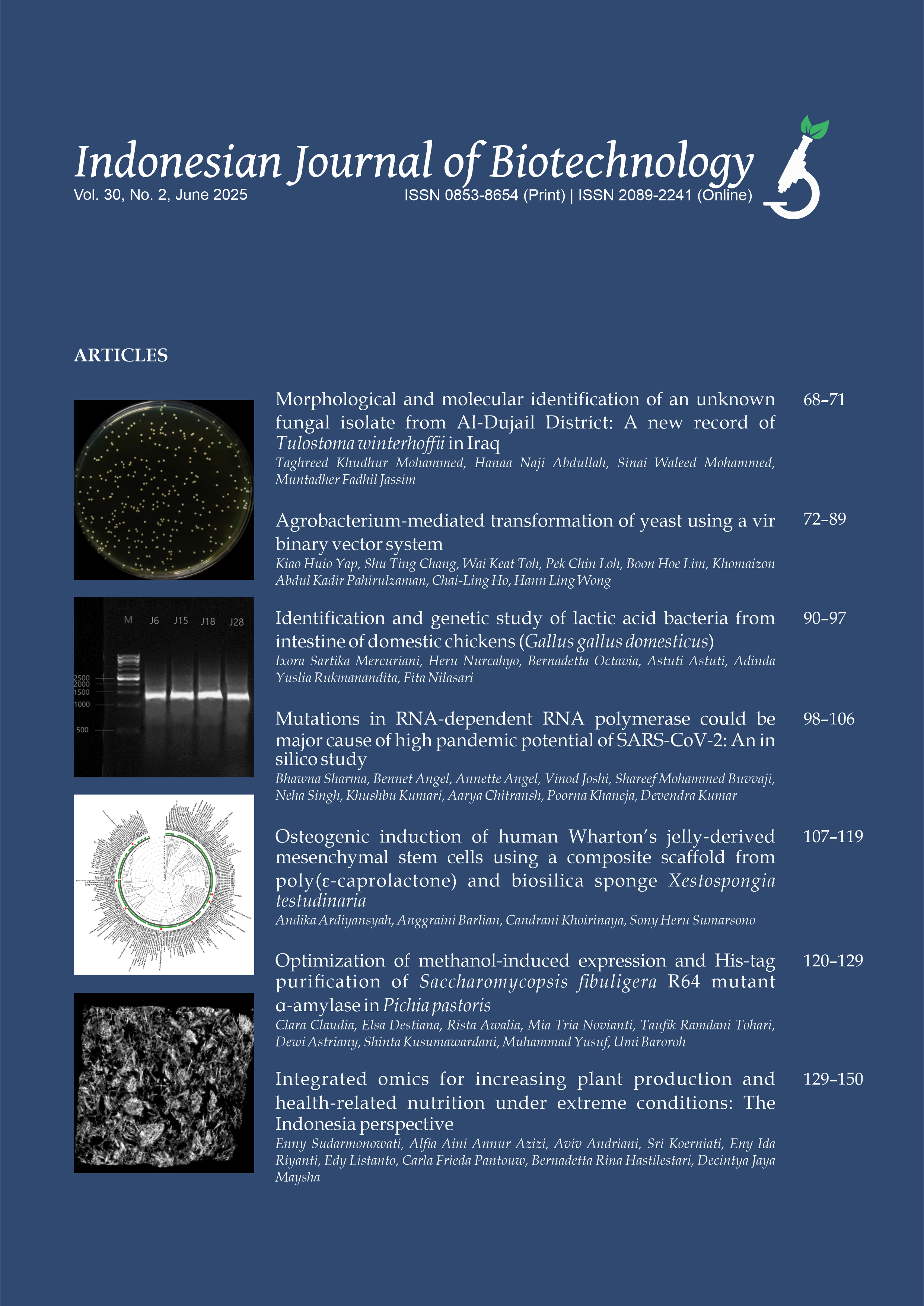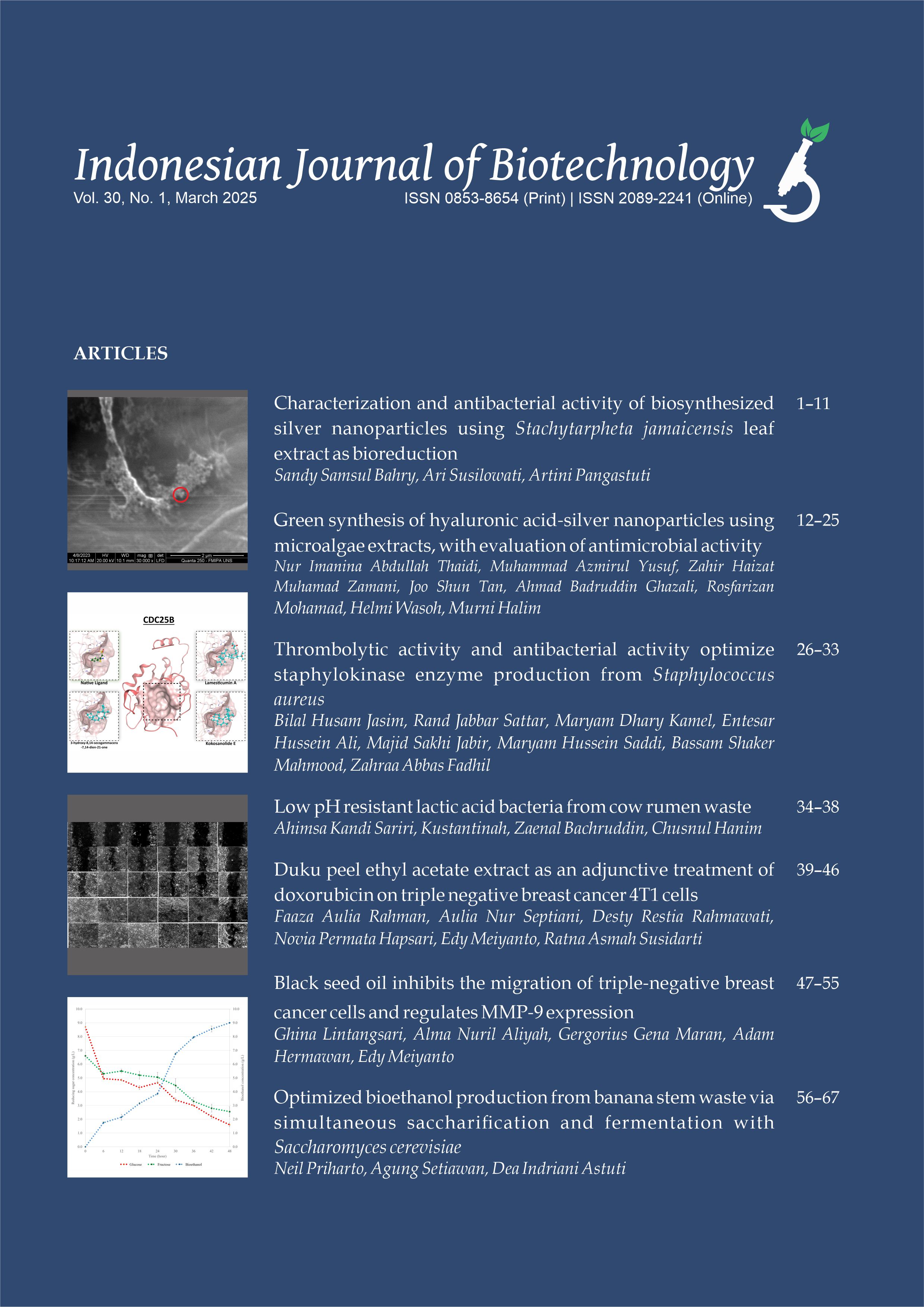Assessment of genetic diversity among surian Toona sinensis Roem in progenies test using random amplified polymorphic DNA markers
Jayusman Jayusman(1*), Muhammad Na’iem(2), Sapto Indrioko(3), Eko Bhakti Hardiyanto(4), ILG Nurcahyaningsih(5)
(1) Centre for Forest Biotechnology and Tree Improvement Research and Development, Jalan Palagan Tentara Pelajar Km. 15, Purwobinangun, Pakem, Sleman, Yogyakarta 55582, Indonesia
(2)
(3) Faculty of Forestry, Universitas Gadjah Mada, Jalan Agro No. 1, Bulaksumur, Yogyakarta 55281, Indonesia
(4) Faculty of Forestry, Universitas Gadjah Mada, Jalan Agro No. 1, Bulaksumur, Yogyakarta 55281, Indonesia
(5) Centre for Forest Biotechnology and Tree Improvement Research and Development, Jalan Palagan Tentara Pelajar Km. 15, Purwobinangun, Pakem, Sleman, Yogyakarta 55582, Indonesia
(*) Corresponding Author
Abstract
Keywords
Full Text:
PDFReferences
Bharmauria V, Narang N, Verma V, Sharma S. 2009. Genetic variation and polymorphism in the Himalayan nettle plant Urtica dioica based on RAPD marker. Journal of Medicinal Plants Research 3:166–170.
Mapping-and-Fingerprinting-of-Grape-and-Pear/biotechniques-42134.html.
Çengel B, Tayanç Y, Kandemir G, Velioglu E, Alan M, Kaya Z. 2012. Magnitude and efficiency of genetic diversity captured from seed stands of Pinus nigra (Arnold) subsp. pallasiana in established seed orchards and plantations.
Cipriano J, Carvalho A, Fernandes C, Gaspar MJ, Pires J, Bento J, Roxo L, Louzada J, Lima-Brito J. 2013. Evaluation of genetic diversity of Portuguese Pinus sylvestris L. populations based on molecular data and inferences about the future use of this germplasm. J. Genet. 92:e41-48.
Collignon A-M, Sype HV de, Favre J-M. 2002. Geographical variation in random amplified polymorphic DNA and quantitative traits in Norway spruce. Canadian Journal of Forest Research 32:266–282. doi:10.1139/x01-198.
Dering M, Chybicki I. 2012. Assessment of genetic diversity in two-species oak seed stands and their progeny populations. Scandinavian Journal of Forest Research 27:2–9. doi:10.1080/02827581.2011.631934.
Edmonds JM, Staniforth M. 1998. Plate 348. Toona sinensis. Curtis’s Botanical Magazine 15:186–193. doi:10.1111/1467-8748.00169.
El-Kassaby YA, Cappa EP, Liewlaksaneeyanawin C, Klápště J, Lstibůrek M. 2011. Breeding without Breeding: Is a Complete Pedigree Necessary for Efficient Breeding? PLOS ONE 6:e25737. doi:10.1371/journal.pone.0025737.
El-Kassaby YA, Lstibůrek M. 2009. Breeding without breeding. Genet Res (Camb) 91:111--120. doi:10.1017/S001667230900007X.
Finkeldey R, Hattemer HH. 2007. Tropical Forest Genetics. Berlin, Heidelberg: Springer Berlin Heidelberg (Tropical Forestry).
Gaspar MJ, Louzada JL, Silva ME, Aguiar A, Almeida MH. 2008. Age trends in genetic parameters of wood density components in 46 half-sibling families of Pinus pinaster. Canadian Journal of Forest Research 38:1470–1477. doi:10.1139/X08-013.
Kimura T, Yagi M, Nishitani C, Onozaki T, Ban Y, Yamamoto T. 2009. Development of SSR markers in carnation (Dianthus caryophyllus). Journal of the Japanese Society for Horticultural Science 78:115–123.
Lemes MR, Gribel R, Proctor J, Grattapaglia D. 2003. Population genetic structure of mahogany (Swietenia macrophylla King, Meliaceae) across the Brazilian Amazon, based on variation at microsatellite loci: implications for conservation. Mol. Ecol. 12:2875–2883.
Li P, Zhan X, Que Q, Qu W, Liu M, Ouyang K, Li J, Deng X, Zhang J, Liao B, et al. 2015. Genetic Diversity and Population Structure of Toona Ciliata Roem. Based on Sequence-Related Amplified Polymorphism (SRAP) Markers. Forests 6:1094–1106. doi:10.3390/f6041094.
Libby WJ. 1973. Domestication Strategies for Forest Trees. Canadian Journal of Forest Research 3:265–276. doi:10.1139/x73-036.
Liesebach H, Yang MS, Schneck V. Genetic diversity and differentiation in a black locust (Robinia pseudoacacia L.) progeny test. International Journal of Forest Genetics. [accessed 2017 Dec 11]. http://agris.fao.org/agris-search/search.do?recordID=SK2005200034.
Liu J, Jiang JM, Chen YT. 2014. Genetic diversity of central and peripheral populations of Toona ciliata var. pubescens, an endangered tree species endemic to China. Genet. Mol. Res. 13:4579–4590. doi:10.4238/2014.June.17.10.
Lorenz TC. 2012. Polymerase chain reaction: basic protocol plus troubleshooting and optimization strategies. J Vis Exp:e3998. doi:10.3791/3998.
Lynch M, Milligan BG. 1994. Analysis of population genetic structure with RAPD markers. Mol. Ecol. 3:91–99.
Martin C, Gonzalez-Benito ME, Iriondo JM. 1997. Genetic diversity within and among populations of a threatened species: Erodium paularense Fern. Gonz. & Izco. Molecular Ecology 6:813–820. doi:10.1046/j.1365-294X.1997.00250.x.
Muona O. 1990. Population genetics in forest tree improvement. Plant population genetics, breeding, and genetic resources.:282–298.
Nosrati H, Hosseinpour-Feizi M-A, Nikniazi M, Razban-Haghighi A. 2012. Genetic variation among different accessions of Lathyrus sativus (Fabaceae) revealed by RAPDs. Botanica Serbica (Serbia). [accessed 2017 Dec 11]. http://agris.fao.org/agris-search/search.do?recordID=RS2012000935.
Pennington TD, Styles BT. 1975. A Generic Monograph of the Meliaceae. Nationaal Herbarium Nederland, Universiteit Leiden branch.
Rohlf F. 1988. NTSYS-pc - Numerical Taxonomy and Multivariate Analysis System. Applied Biostatistics Inc. New York 2.1.
Runo MS, Muluvi GM, Odee DW. 2004. Analysis of genetic structure in Melia volkensii (Gurke.) populations using random amplified polymorphic DNA. African Journal of Biotechnology 3:421–425.
Sambrook J, Fritsch EF, Maniatis T. 1989. Molecular cloning: a laboratory manual. 2nd ed. [accessed 2017 Dec 11]. https://www.cabdirect.org/cabdirect/abstract/19901616061.
Shiraishi S, Watanabe A. 1995. Identification of chloroplast genome between Pinus densiflora Sieb. et Zucc. and P. thunbergii Parl. based on the polymor- phism in rbcL gene. Nihon Ringakkai Shi/Journal of the Japanese Forestry Society, THE JOURNAL OF THE JAPANESE FORESTRY SOCIETY 77:429–436.
Silveira SR, Ruas PM, Ruas C de F, Sera T, Carvalho V de P, Coelho ASG. 2003. Assessment of genetic variability within and among coffee progenies and cultivars using RAPD markers. Genetics and Molecular Biology 26:329–336. doi:10.1590/S1415-47572003000300018.
Song B. 2000. Genetic Relatedness among Lansium domesticum Accessions Using RAPD Markers. Annals of Botany 86:299–307. doi:10.1006/anbo.2000.1186.
Tavares R, Viana AP, Barroso DG, Júnior A, Do AT. 2012. Genetic diversity in Australian Cedar genotypes selected by mixed models. Ciência e Agrotecnologia 36:171–179. doi:10.1590/S1413-70542012000200005.
Tingey SV, Rafalski JA, Hanafey MK. 1994. Genetic Analysis with RAPD Markers. In: Plant Molecular Biology. Springer, Berlin, Heidelberg. (NATO ASI Series). p. 491–500. [accessed 2017 Dec 11]. https://link.springer.com/chapter/10.1007/978-3-642-78852-9_45.
Vellend M, Geber MA. 2005. Connections between species diversity and genetic diversity. Ecology Letters 8:767–781. doi:10.1111/j.1461-0248.2005.00775.x.
Wang B-Y, Shi L, Ruan Z-Y, Deng J. 2010. Genetic diversity and differentiation in Dalbergia sissoo (Fabaceae) as revealed by RAPD. Genetics and Molecular Research 10:114–120. doi:10.4238/vol10-1gmr995.
Wang C, Cao J, Tian S, Wang Y, Chen Z, Chen M, Gong G. 2008. Germplasm resources research of <Emphasis Type=“Italic”>Toona sinensis</Emphasis> with RAPD and isoenzyme analysis. Biologia 63:320–326. doi:10.2478/s11756-008-0066-3.
Wee AKS, Li C, Dvorak WS, Hong Y. 2012. Genetic diversity in natural populations of <Emphasis Type=“Italic”>Gmelina arborea</Emphasis>: implications for breeding and conservation. New Forests 43:411–428. doi:10.1007/s11056-011-9288-2.
Weising K, Nybom H, Pfenninger M, Wolff K, Meyer W. 1994. DNA Fingerprinting in Plants and Fungi. CRC Press.
Williams JG, Kubelik AR, Livak KJ, Rafalski JA, Tingey SV. 1990. DNA polymorphisms amplified by arbitrary primers are useful as genetic markers. Nucleic Acids Res. 18:6531–6535.
Xing PY, Liu T, Song ZQ, Li XF. 2016. Genetic diversity of Toona sinensis Roem in China revealed by ISSR and SRAP markers. Genet. Mol. Res. 15. doi:10.4238/gmr.15038387.
Yulianti Y. 2011. Genetic variation of Melia azedarach in community forests of West Java assessed by RAPD. Biodiversitas, Journal of Biological Diversity 12:64–69. doi:10.13057/biodiv/d120202.
Zarek M. 2009. RAPD analysis of genetic structure in four natural populations of Taxus baccata from southern Poland. Acta Biologica Cracoviensia. Series Botanica 51:67–75.
Zhou G-X, Zhang B-G, Lin L, Qin Z, Lin G, Ya-Yun P, Xia C. 2010. Study on the relationship between Toona sinensis Roem stand productivity and site conditions in Sichuan Basin. ECOLOGICAL ECONOMY 6:387–394.
Zobel B, Talbert J. 1984. Applied forest tree improvement. [accessed 2017 Dec 11]. https://www.cabdirect.org/cabdirect/abstract/19840699048.
Article Metrics
Refbacks
- There are currently no refbacks.
Copyright (c) 2017 The Author(s)

This work is licensed under a Creative Commons Attribution-ShareAlike 4.0 International License.









